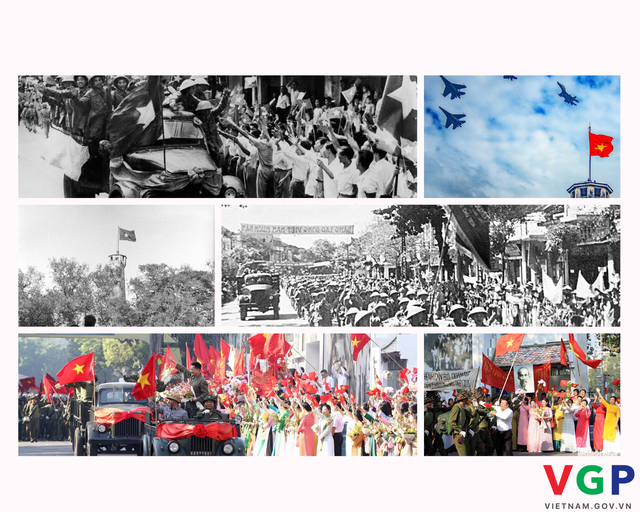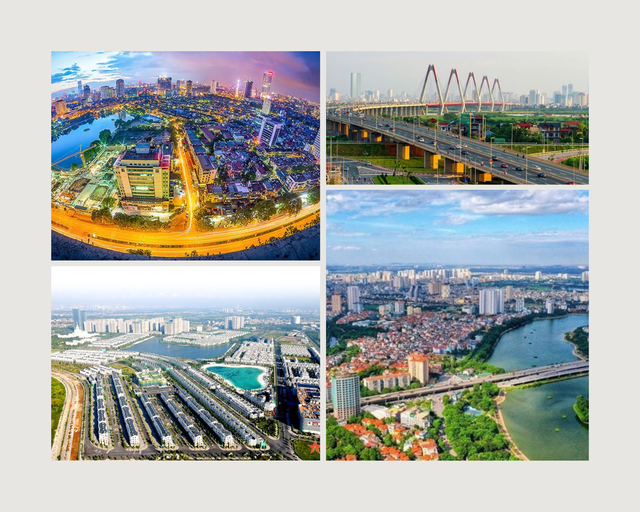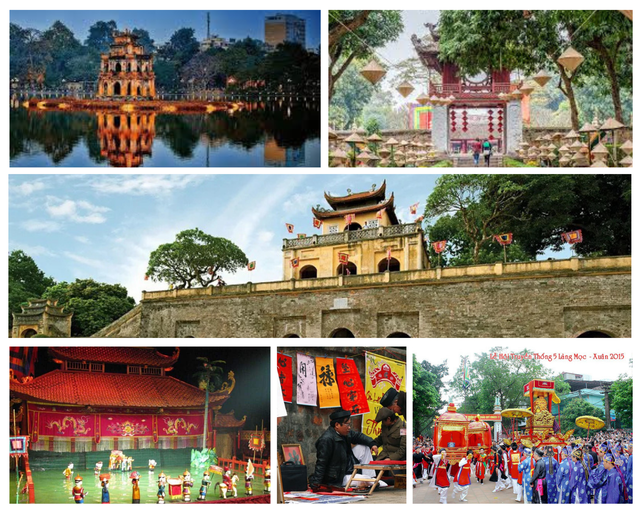Ha Noi’s 71-year journey of integration and development since liberation
VGP - The 10th of October 1954 marks a defining milestone in Vietnamese history when the capital city of Ha Noi was officially liberated.
This historic event not only symbolized the nation's hard-won independence but also opened a new chapter for Ha Noi – one of reconstruction, renewal, integration, and growth.

A parade reenacts the historic moment of the army's march into Ha Noi on October 10, 1954, as part of the Cultural Festival for Peace celebrating the 70th anniversary of the capital's liberation Photo: VGP/Kim Loan
Seventy-one years later, Ha Noi has transformed remarkably, evolving into the nation's foremost center of politics, economy, and culture while asserting its pivotal role in Vietnam's ongoing journey of reform and international integration.

Photo: VGP/Kim Loan
Economic engine of the nation
For more than seven decades – especially throughout the reform period – Ha Noi has stood as one of Viet Nam's most dynamic growth poles. Its diversified economy continues to make substantial contributions to national GDP and budget revenue, affirming the capital's status as a financial, commercial, service, and high-tech industrial hub.
Between 2021 and 2025, Ha Noi's Gross Regional Domestic Product (GRDP) is projected to expand by an average of 6.57 percent annually, 1.1 times higher than the national rate. The city's economy is expected to reach US$63 billion, 1.42 times that of 2020, accounting for 41.5 percent of the Red River Delta's output and 12.6 percent of Viet Nam's total GDP. Per capita GRDP is forecast to rise to US$7,200 per year, demonstrating a continued shift toward a modern, service-oriented structure.
In the third quarter of 2025, the city's GRDP increased 8.85 percent, surpassing the same period last year. Agricultural production rose by over 3 percent, while agricultural and forestry exports exceeded US$2 billion.
Ha Noi continues to attract strong investment flows, both domestic and international, with tens of thousands of new enterprises established annually. Major multinational corporations, research institutions, and high-tech parks have taken root, shaping a vibrant, globally connected economy.
As of mid-2025, total foreign direct investment (FDI) stood at about US$61.5 billion across 7,710 active projects, keeping Ha Noi among Viet Nam's top FDI destinations. In the first eight months of 2025 alone, the city drew US$3.82 billion in FDI – 1.6 times higher than the same period last year.
Beyond economic growth, Ha Noi is taking the lead in digital transformation, green growth, circular economy development, and knowledge-based industries – key pillars of sustainable development aligned with global trends.
Ha Noi is pumping water from West Lake into the To Lich River through two 1.5 km-long HDPE pipes, marking the start of the river's rehabilitation after years of pollution. (Photo: VNA)

Preserving heritage, fostering cultural vitality
If the economy is Ha Noi's engine, culture remains its soul. With a history spanning over a millennium, the capital stands as the cradle of Vietnamese civilization and a national center of education, science, and technology.
Often described as a "living museum" of Vietnamese culture, Ha Noi reflects the nation's long journey of endurance and renewal – where every street, temple, and monument tells a story of resilience. As both the political and cultural heart of the country, Ha Noi bears the mission of preserving and promoting the nation's unique cultural identity.
In recent years, the city has rolled out extensive programs to restore and revitalize key heritage sites, including the Old Quarter, the Temple of Literature, and the Imperial Citadel of Thang Long, a UNESCO World Heritage Site.
According to the draft political report for the upcoming 18th Congress of the Ha Noi Party Committee (2025–2030 term), over VND5.17 trillion (US$196.09 million) has been allocated from the state budget for cultural and sports programs, along with VND 1.7 trillion for heritage restoration, museum renovation, and cultural infrastructure. Nearly 200 historical and cultural relics have been restored in the past five years, raising the total number of recognised sites to nearly 6,000.
Cultural vibrancy also extends to modern life: more than 3,000 artistic and cultural events were held between 2020 and 2025, embodying the city's commitment to making culture accessible to all communities.
Ha Noi's designation as a UNESCO Creative City of Design (2019) reaffirms its global reputation for blending tradition with innovation – positioning culture not only as heritage but as a form of soft power that drives sustainable development and international engagement.
A leading destination in Asia
For consecutive years, Ha Noi has been honored as Asia's Leading City Destination and one of the world's top urban getaways. Alongside heritage and festival tourism, the capital is diversifying into creative, green, and community-based tourism experiences, reflecting global travel trends.
In the first nine months of 2025, the city welcomed 26.07 million visitors, up 23.8% year-on-year, including 5.54 million international arrivals – solidifying its reputation as Vietnam's top tourist destination.
With world-class hotels, modern convention centers, and smart urban services, Hanoi continues to build its image as a safe, friendly, and dynamic destination for visitors from across the world.
Embracing global integration
Beyond its role as the national hub, Ha Noi has established itself as Vietnam's gateway to the world. The capital has successfully hosted major international events such as the SEA Games, the DPRK–US Summit, the UN Vesak Celebrations, and the IPU-132 Assembly.
Later this month, on October 25–26, the city will host the United Nations Convention Against Cybercrime Signing Ceremony, providing another opportunity to showcase Hanoi's thousand-year heritage and its commitment to global cooperation.
Hanoi also maintains sister-city relationships and cooperation agreements with numerous capitals and major cities worldwide, enabling the exchange of expertise in urban management, culture, education, and technology. These partnerships have not only elevated Ha Noi's international profile but have also strengthened Vietnam's standing on the global stage.
Capital moving forward
Seventy-one years after its liberation, Ha Noi today embodies a heroic past and a dynamic spirit of reform, innovation, and integration. Its achievements in economy, culture, tourism, and diplomacy reflect the collective determination and creativity of its leadership and people.
Chairman of the Ha Noi Party Committee Tran Sy Thanh emphasized:
As Ha Noi celebrates its 71st Liberation Day, it shines not only as a historic capital but as a beacon of progress, innovation, and global integration — continuing its unceasing journey toward a brighter, more sustainable future./.

